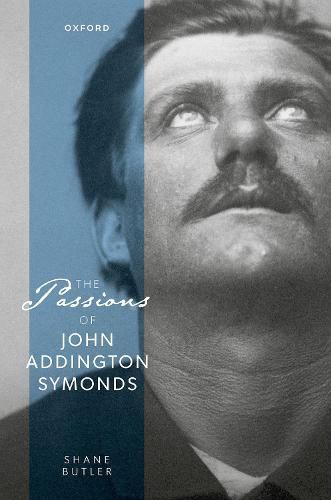Readings Newsletter
Become a Readings Member to make your shopping experience even easier.
Sign in or sign up for free!
You’re not far away from qualifying for FREE standard shipping within Australia
You’ve qualified for FREE standard shipping within Australia
The cart is loading…






John Addington Symonds (Bristol 1840 - Rome 1893) was one of Victorian Britain’s most prolific authors, with works that included poems, translations, travel essays, and scholarly studies on topics ranging from classical literature to the Renaissance to the poetry of his contemporaries. Today, however, he is usually remembered for his long unpublished Memoirs, a major early monument of queer life-writing, and for two privately printed, secretly circulated essays, one of which includes the earliest printed appearance in English of the word homosexual. This new word, first coined in German, has long provided a useful milestone for historians of sexuality charting the emergence not only of new typologies but of whole new regimes of knowledge. But what of the rest of Symonds’s vast body of work? This book returns to Symonds, not as the origin of a now familiar history, but as a far more complex thinker, with an ambitious vision of the queerness of the world itself-and of what it means to live in it.
This is the first monograph, other than biographies and editions, devoted entirely to Symonds and the first critical analysis to embrace a representative selection of his varied oeuvre. Additionally, it explores Symonds’s place in the aesthetic and philosophical movements of his century, as well as his important relationships to predecessors such as Winckelmann, Byron, and Hegel, and contemporaries like Benjamin Jowett, Edward Carpenter, Frederic Myers, Robert Louis Stevenson, Oscar Wilde, Walter Pater, and Henry James, and successors like Sigmund Freud.
Engagingly written and meticulously researched, including thorough consultation of unpublished archival materials, The Passions of John Addington Symonds brings this neglected protagonist of nineteenth-century thought vividly to life, unsettling conventional genealogies of how we think today.
$9.00 standard shipping within Australia
FREE standard shipping within Australia for orders over $100.00
Express & International shipping calculated at checkout
John Addington Symonds (Bristol 1840 - Rome 1893) was one of Victorian Britain’s most prolific authors, with works that included poems, translations, travel essays, and scholarly studies on topics ranging from classical literature to the Renaissance to the poetry of his contemporaries. Today, however, he is usually remembered for his long unpublished Memoirs, a major early monument of queer life-writing, and for two privately printed, secretly circulated essays, one of which includes the earliest printed appearance in English of the word homosexual. This new word, first coined in German, has long provided a useful milestone for historians of sexuality charting the emergence not only of new typologies but of whole new regimes of knowledge. But what of the rest of Symonds’s vast body of work? This book returns to Symonds, not as the origin of a now familiar history, but as a far more complex thinker, with an ambitious vision of the queerness of the world itself-and of what it means to live in it.
This is the first monograph, other than biographies and editions, devoted entirely to Symonds and the first critical analysis to embrace a representative selection of his varied oeuvre. Additionally, it explores Symonds’s place in the aesthetic and philosophical movements of his century, as well as his important relationships to predecessors such as Winckelmann, Byron, and Hegel, and contemporaries like Benjamin Jowett, Edward Carpenter, Frederic Myers, Robert Louis Stevenson, Oscar Wilde, Walter Pater, and Henry James, and successors like Sigmund Freud.
Engagingly written and meticulously researched, including thorough consultation of unpublished archival materials, The Passions of John Addington Symonds brings this neglected protagonist of nineteenth-century thought vividly to life, unsettling conventional genealogies of how we think today.